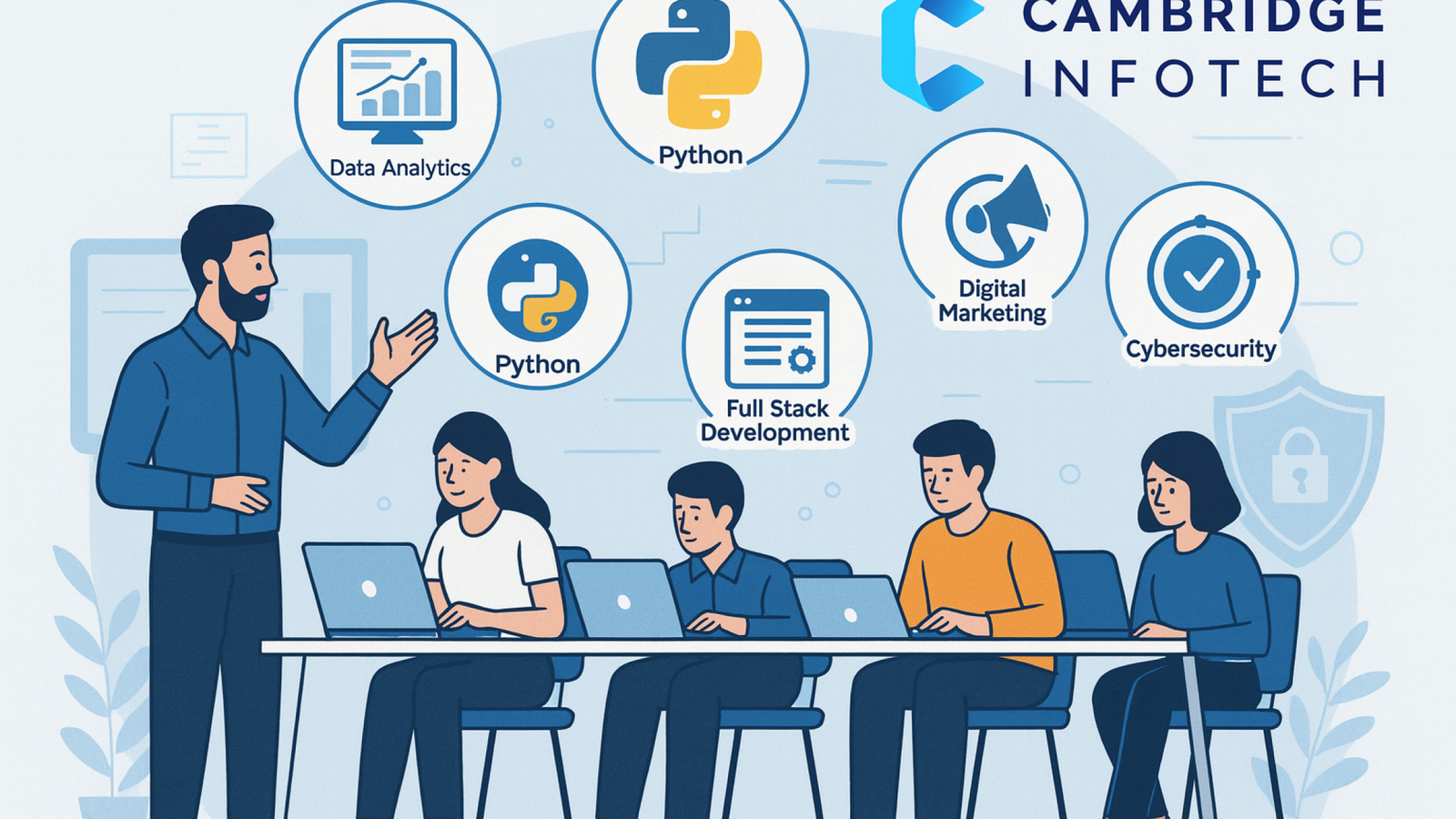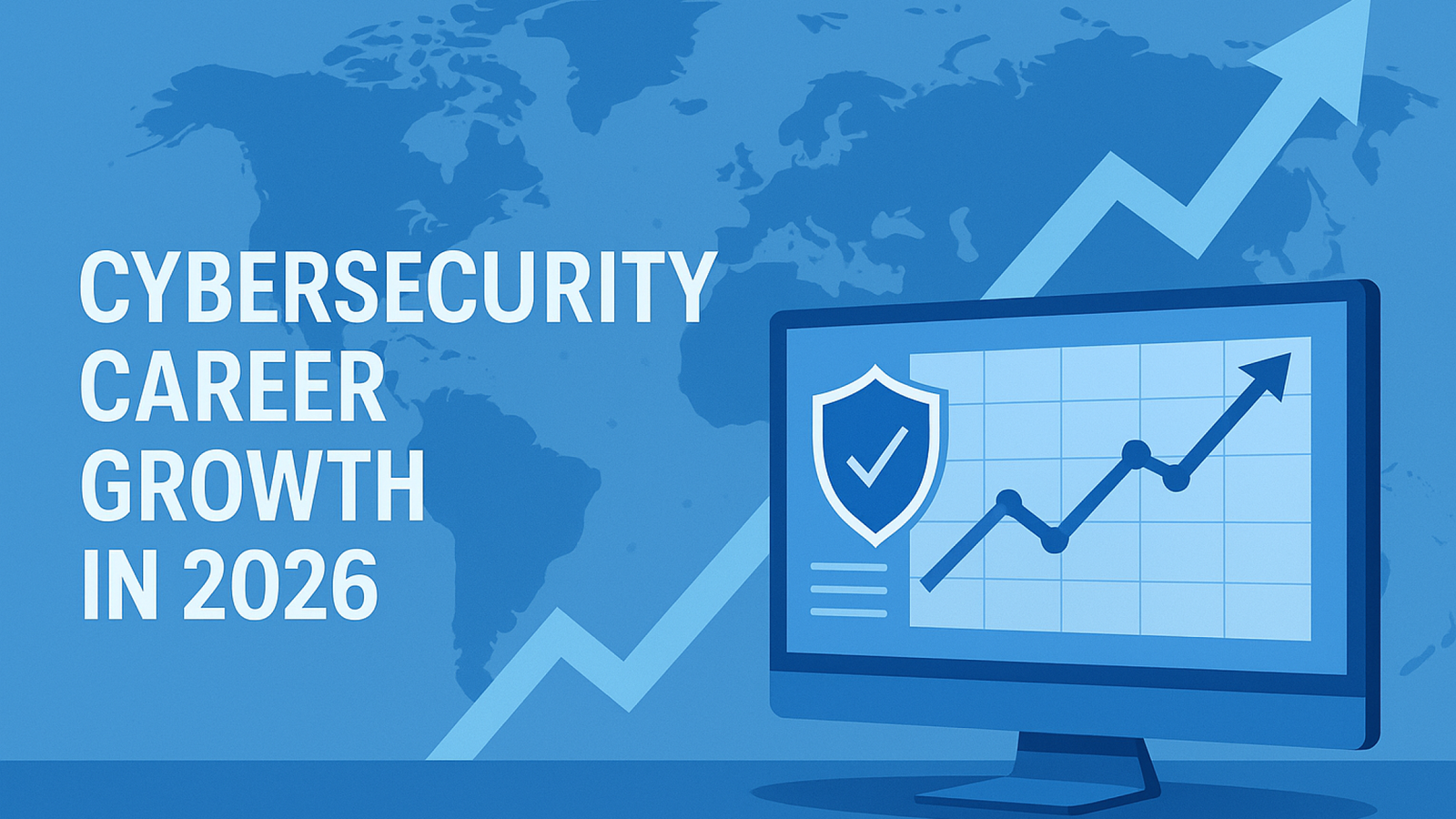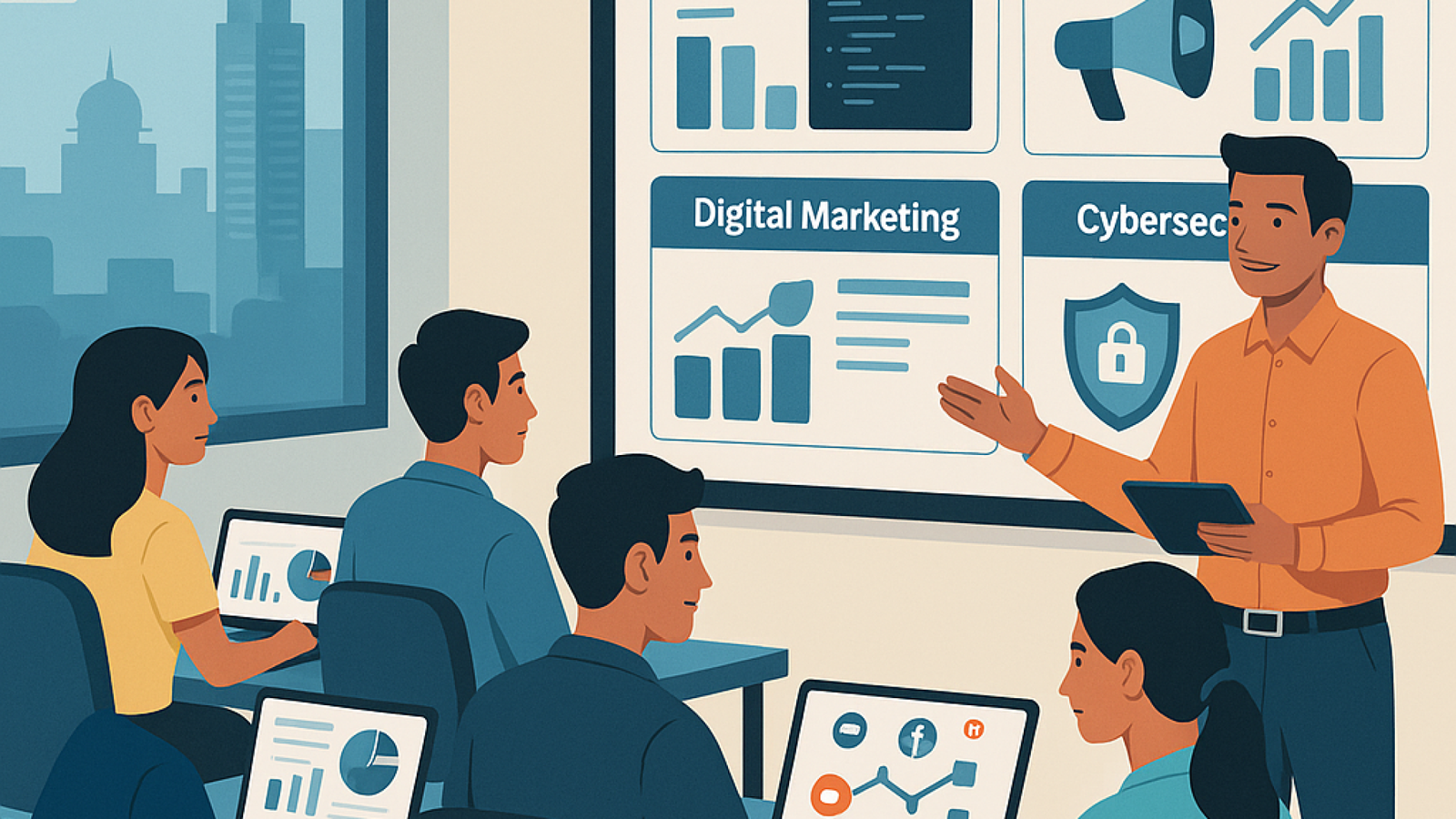Top AI in Digital Marketing 2025 – Unleash Success
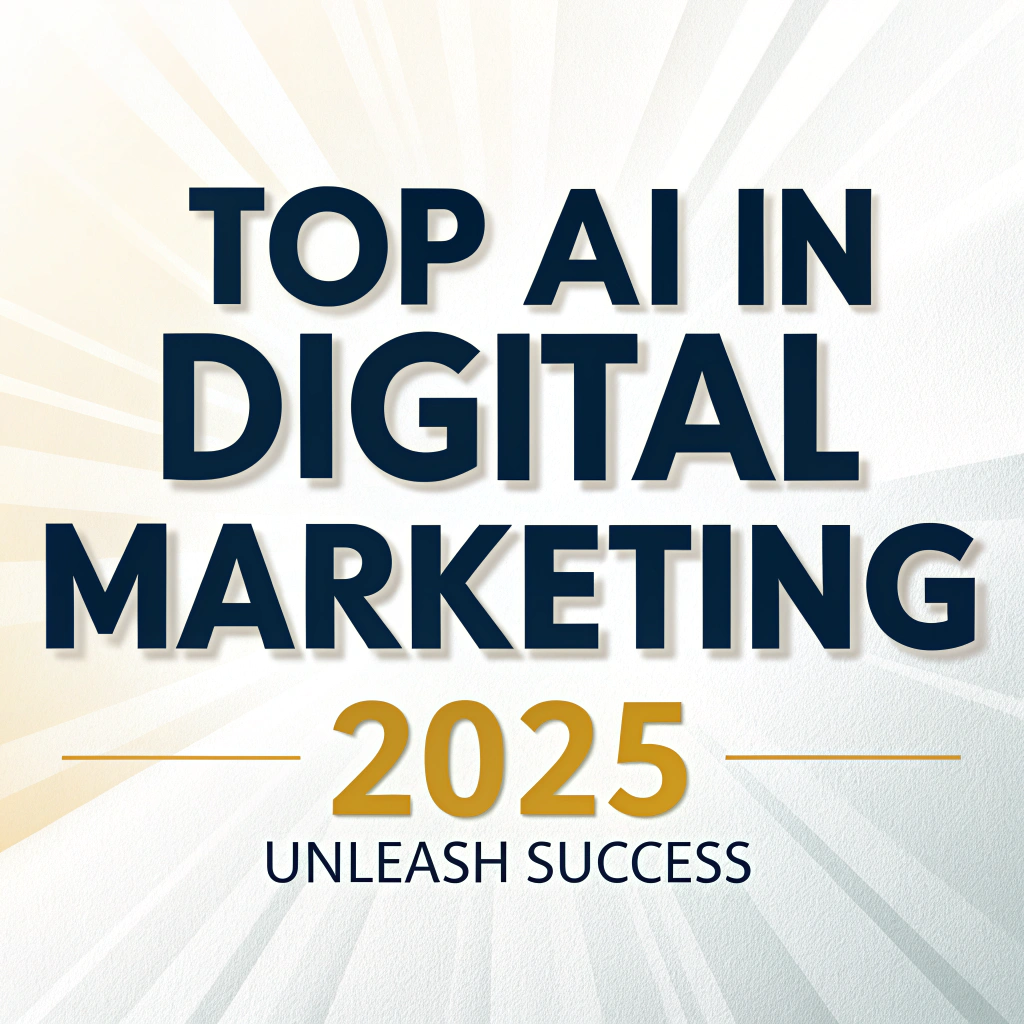
Introduction: Why AI is the Future of Digital Marketing
Digital marketing has always been about connecting with the right audience at the right time, with the right message. But in today’s rapidly evolving digital landscape, traditional marketing strategies alone are no longer sufficient. Consumers are smarter, more connected, and more demanding than ever before, and businesses are under intense pressure to deliver personalized, timely, and relevant experiences.
This is where Artificial Intelligence (AI) steps in, transforming the way businesses approach marketing. AI is no longer just a futuristic concept—it has become the backbone of modern marketing strategies across industries, enabling brands to analyze vast amounts of data, predict customer behavior, automate campaigns, and deliver hyper-personalized experiences at scale.
The Rise of AI in Digital Marketing
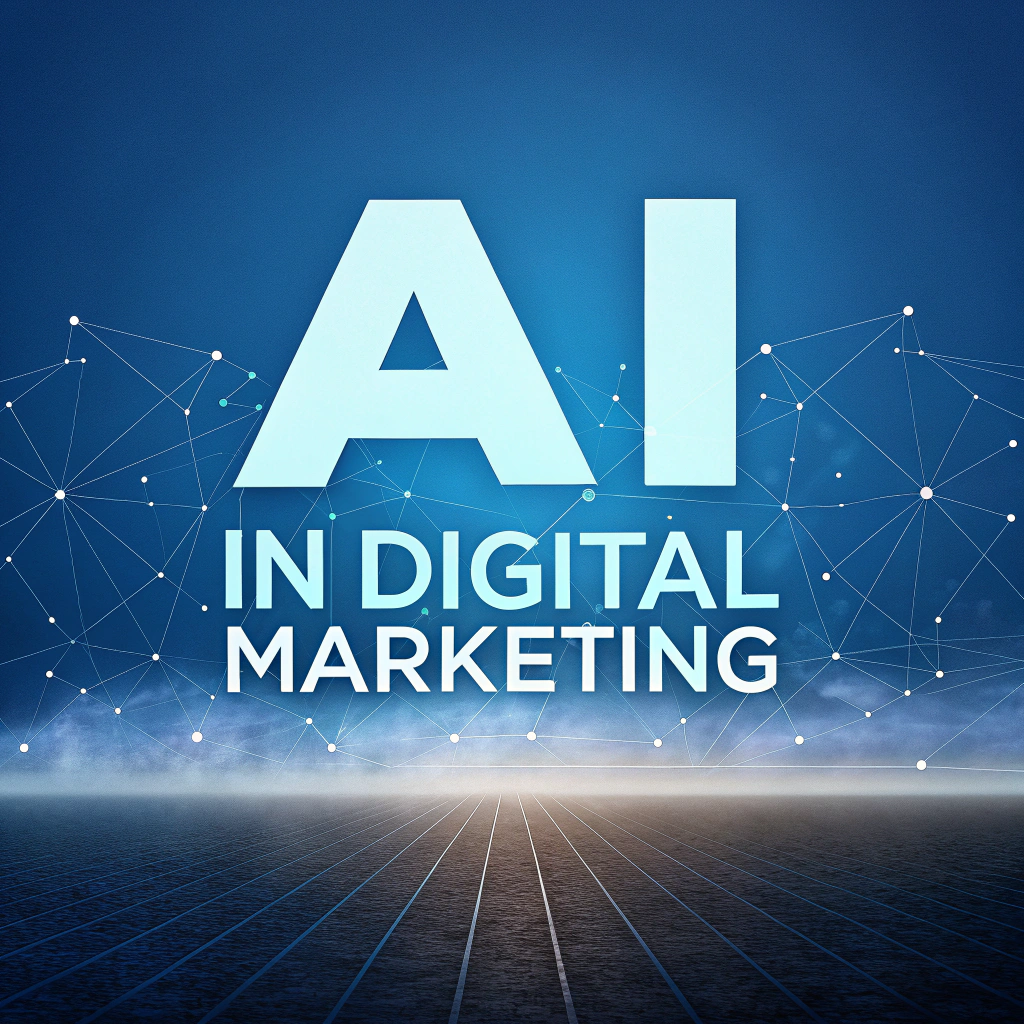 The adoption of AI in marketing is growing exponentially. According to a Gartner report, over 80% of marketing leaders plan to invest in AI-powered tools within the next few years. AI is now being used to optimize everything from ad targeting to content creation, email campaigns, customer segmentation, and social media strategies.
The adoption of AI in marketing is growing exponentially. According to a Gartner report, over 80% of marketing leaders plan to invest in AI-powered tools within the next few years. AI is now being used to optimize everything from ad targeting to content creation, email campaigns, customer segmentation, and social media strategies.
Some examples of AI-driven marketing include:
Amazon’s product recommendations: AI analyzes user behavior and purchase history to recommend products that customers are most likely to buy.
Netflix’s content suggestions: AI algorithms predict what shows or movies a user might enjoy based on their viewing patterns.
Spotify’s personalized playlists: AI curates daily playlists tailored to each user’s taste.
Google Ads & Meta Ads automation: AI predicts user intent and optimizes ad delivery to maximize ROI.
These examples show that AI is not just a tool—it’s a strategy that drives measurable results. Businesses that fail to adopt AI risk falling behind their competitors.
Why AI is Essential for Modern Marketers
Hyper-Personalization at Scale
Today’s consumers expect marketing messages tailored specifically to their needs and interests. AI enables marketers to deliver personalized content, offers, and recommendations to millions of users simultaneously. For instance, e-commerce platforms like Amazon and Flipkart use AI to suggest products based on individual browsing patterns, purchase history, and even seasonal trends.Predictive Analytics and Customer Insights
AI can analyze massive datasets to identify patterns and predict future behavior. This allows marketers to anticipate customer needs, segment audiences more effectively, and optimize campaigns in real time. Predictive analytics is especially useful in:
Email marketing campaigns to increase open and click-through rates
Customer churn prevention strategies
Sales forecasting and inventory planning
Automation of Marketing Tasks
Marketing tasks that once required hours of manual work can now be automated with AI. For example:
Chatbots handle customer inquiries 24/7
AI-powered tools schedule and post social media content automatically
Automated ad bidding adjusts campaigns in real time for optimal ROI
Enhanced ROI and Cost Efficiency
AI doesn’t just save time; it also improves the efficiency of marketing budgets. By targeting the right audience at the right time with the right message, AI reduces wasted ad spend and increases conversion rates. Companies using AI-driven marketing report higher ROI and faster revenue growth compared to those relying solely on manual strategies.
Impact of AI on Different Marketing Channels
AI is reshaping multiple aspects of digital marketing:
Content Marketing: AI tools can now generate high-quality blog posts, social media content, and ad copy. Tools like Jasper, Copy.ai, and Writesonic use natural language processing to create human-like content in seconds.
Search Engine Optimization (SEO): AI analyzes search trends, competition, and user intent to optimize website content for better rankings. Tools like SurferSEO, SEMrush AI, and Clearscope help marketers create data-driven content strategies.
Social Media Marketing: AI predicts which posts will perform best, determines optimal posting times, and even suggests hashtags. Platforms like Instagram and TikTok use AI algorithms to personalize content feeds.
Email Marketing: AI segments email lists, predicts the best time to send emails, and personalizes subject lines and content to increase engagement.
AI in Customer Experience and Engagement
AI also plays a crucial role in improving customer experience. Chatbots, virtual assistants, and AI-powered recommendation engines ensure instant, personalized interactions, which increases customer satisfaction and loyalty. For instance, Sephora uses AI chatbots to provide product recommendations and tutorials, enhancing the shopping experience for millions of users worldwide.
Benefits of Learning AI in Digital Marketing for Students & Professionals
For students and professionals looking to build a career in marketing, understanding AI is no longer optional—it’s essential. Here’s why:
Career Advantage: AI skills make you highly sought after by employers, increasing your chances of landing a high-paying job.
Future-Proof Skills: As AI adoption grows, professionals with AI expertise will remain relevant in the evolving job market.
Entrepreneurial Edge: If you plan to start a business, AI can help you make smarter marketing decisions and scale faster.
Conclusion:
The integration of AI in digital marketing is no longer a trend—it’s a revolution. From hyper-personalization and predictive analytics to automation and ROI optimization, AI is transforming the way businesses connect with customers.
For students, freshers, and marketing professionals, understanding and leveraging AI is the key to staying competitive, innovative, and successful in the digital era.
Next we will explore the key benefits of AI in digital marketing, showing exactly how it can transform marketing strategies and career opportunities alike.
Key Benefits of AI in Digital Marketing
Artificial Intelligence has revolutionized the digital marketing landscape, creating opportunities for businesses to reach their audiences more effectively, efficiently, and intelligently. The benefits of AI in digital marketing are vast, and organizations that adopt AI strategies enjoy a significant competitive edge over those relying solely on traditional marketing methods.
In this section, we will explore the most critical benefits of AI in digital marketing, why it matters for businesses and students, and how it transforms strategies, campaigns, and outcomes.
1. Hyper-Personalization for Every Customer
One of the most significant advantages of AI in digital marketing is hyper-personalization. Consumers today expect marketing messages that speak directly to their needs, preferences, and behavior. AI makes this possible at scale.
How It Works:
AI algorithms analyze user behavior, past purchases, search history, social media activity, and engagement patterns to predict what each customer is likely to respond to. Tools like HubSpot AI, Salesforce Einstein, and Adobe Sensei enable marketers to create individualized experiences for millions of users simultaneously.
Real-World Example:
Amazon’s recommendation engine is powered by AI, analyzing users’ browsing patterns and purchase histories to suggest products they are most likely to buy. Netflix uses AI to recommend shows and movies based on what users have watched before.
Why It Matters:
Increases engagement rates
Improves customer loyalty
Boosts conversions and sales
Strengthens brand trust
By using AI in digital marketing, businesses can deliver the right message to the right audience at exactly the right time, creating a personal connection that drives results.
2. Predictive Analytics and Data-Driven Decisions
Another major benefit of AI in digital marketing is predictive analytics. Marketers are no longer forced to rely on intuition; AI can predict trends, consumer behavior, and outcomes based on historical data.
How AI Helps:
Identifies patterns in customer behavior
Forecasts buying trends and seasonal demands
Suggests optimized strategies for campaigns
Determines the likelihood of customer churn
Example:
Spotify uses AI to analyze listening patterns and predict what songs or playlists users might enjoy, keeping them engaged for longer periods. Similarly, e-commerce platforms use predictive analytics to optimize inventory and product recommendations.
Benefits for Businesses:
Reduces risk in marketing campaigns
Optimizes budget allocation
Helps in launching targeted campaigns with better ROI
For students and professionals, learning how to leverage AI in digital marketing for predictive analytics is a high-value skill, as companies are increasingly investing in data-driven decision-making.
3. Automation of Repetitive Tasks
AI is transforming digital marketing by automating repetitive, time-consuming tasks, allowing marketers to focus on strategy and creativity. Automation through AI saves time, reduces errors, and increases efficiency.
Tasks That Can Be Automated with AI:
Social media posting and scheduling
Email campaigns and personalized email delivery
Ad bidding and optimization
Customer support through AI-powered chatbots
Example:
Chatbots on websites or social media platforms can instantly answer customer queries, recommend products, and even guide users through the purchase process, all without human intervention. Platforms like Drift and ManyChat provide sophisticated AI-driven automation tools.
Advantages of Automation:
Reduces operational costs
Ensures 24/7 availability and responsiveness
Enhances customer experience
Frees marketers to focus on strategy and content creation
By implementing AI in digital marketing, businesses can achieve consistent results, operational efficiency, and higher customer satisfaction, which are critical for growth.
4. Enhanced Customer Insights
Understanding your audience is the foundation of effective digital marketing. AI allows marketers to gain deep insights into customer behavior and preferences, going beyond basic demographics.
How AI Provides Insights:
Analyzes website behavior and engagement
Monitors social media interactions
Tracks purchase history and loyalty patterns
Provides sentiment analysis on customer feedback
Example:
Tools like Google Analytics AI features and HubSpot AI provide marketers with actionable insights, such as which type of content drives engagement, the best time to post on social media, and what products a customer is likely to purchase next.
Benefits:
Helps create highly targeted marketing campaigns
Improves audience segmentation
Enables personalized marketing at scale
Enhances customer retention and loyalty
With AI-driven insights, businesses can make informed decisions and predict what strategies will work best, creating a measurable impact on sales and brand growth.
5. AI-Powered Content Creation
Content is still king in digital marketing, but creating high-quality content consistently can be challenging. AI tools now help marketers generate, optimize, and personalize content across multiple channels.
Popular AI Content Tools:
Jasper AI and Copy.ai – Generate blogs, social media posts, and ad copy
Writesonic – Helps produce creative and marketing content
SurferSEO – AI-assisted content optimization for search engines
Advantages:
Saves time and reduces effort in content creation
Ensures SEO-friendly content with better ranking potential
Supports A/B testing of different content formats
Enables multilingual content for global reach
By integrating AI in digital marketing, content creation becomes faster, smarter, and more targeted, allowing businesses to engage customers with highly relevant content consistently.
6. Optimized Ad Campaigns and Targeting
Advertising is at the heart of digital marketing, and AI has revolutionized how ads are targeted and optimized. AI algorithms can predict user intent, behavior, and engagement patterns to deliver ads that are most likely to convert.
Key Applications:
Programmatic ad buying
Predictive ad targeting
Automated bid optimization
Personalized ad creatives based on user behavior
Example:
Google Ads and Meta Ads use AI to automatically optimize ad placements, targeting, and bidding strategies for maximum ROI. Platforms analyze millions of data points in real time to ensure ads are delivered to users most likely to convert.
Benefits:
Higher conversion rates
Reduced ad spend waste
Better return on investment (ROI)
Real-time optimization and reporting
With AI-powered advertising, marketers can reach the right audience with the right message, ensuring campaigns are both cost-effective and impactful.
7. Improved Customer Experience
AI in digital marketing isn’t just about efficiency; it’s about creating a superior customer experience. Personalized recommendations, chatbots, and predictive services ensure that customers receive what they want, when they want it.
Examples of AI in Customer Experience:
AI chatbots offering 24/7 support
Personalized product recommendations in e-commerce
Voice assistants like Alexa and Google Assistant assisting in product discovery
AI-driven email marketing campaigns tailored to individual user preferences
Advantages:
Increased customer satisfaction and loyalty
Reduced response time for queries
Builds trust and brand credibility
Encourages repeat purchases
For marketers, mastering AI in digital marketing ensures they can deliver exceptional experiences at scale, which directly impacts business growth.
8. Enhanced ROI and Performance Tracking
One of the most measurable benefits of AI in digital marketing is better ROI and performance tracking. AI can track campaigns, analyze results, and provide actionable recommendations for improvement.
How AI Helps Track Performance:
Real-time analytics for campaigns
Insights on which ads, emails, or content perform best
Predictive recommendations for budget allocation
Identifying underperforming channels and optimizing them
Example:
Platforms like HubSpot AI and Salesforce Einstein provide marketers with dashboards that show engagement metrics, conversion rates, and revenue attribution, enabling smarter decision-making.
Benefits:
Maximizes marketing spend efficiency
Reduces guesswork in campaign management
Ensures data-driven decisions
Accelerates business growth
By using AI in digital marketing, companies can make faster, smarter, and more profitable decisions, ensuring every marketing dollar is well-spent.
9. Scalability and Adaptability
AI allows marketing strategies to scale rapidly without a proportional increase in human resources. Businesses can handle millions of customers, personalized campaigns, and multiple channels simultaneously.
Examples of Scalability:
Automating thousands of email campaigns simultaneously
Running multi-channel social media campaigns with AI scheduling and targeting
Generating dynamic content for websites and apps
Adaptability:
AI continuously learns and adapts to changes in customer behavior, industry trends, and platform algorithms, ensuring campaigns remain relevant and effective over time.
Benefits:
Scalable marketing without additional staffing costs
Adaptable strategies that evolve with customer needs
Consistent brand messaging across channels
This scalability is especially valuable for startups and SMEs that want to compete with larger enterprises without massive marketing budgets.
Applications of AI in Digital Marketing
 Artificial Intelligence has moved beyond a supporting role and is now integrated into almost every aspect of digital marketing. From automating repetitive tasks to predicting consumer behavior, AI empowers marketers to make smarter decisions, save time, and deliver hyper-personalized experiences. In this section, we will explore the most impactful applications of AI in digital marketing, showing how businesses and professionals are leveraging it to achieve superior results.
Artificial Intelligence has moved beyond a supporting role and is now integrated into almost every aspect of digital marketing. From automating repetitive tasks to predicting consumer behavior, AI empowers marketers to make smarter decisions, save time, and deliver hyper-personalized experiences. In this section, we will explore the most impactful applications of AI in digital marketing, showing how businesses and professionals are leveraging it to achieve superior results.
1. AI-Powered SEO Optimization
Search Engine Optimization (SEO) is a core pillar of digital marketing. AI in digital marketing has transformed SEO from a manual, guesswork-driven process into a data-driven, intelligent strategy.
How AI Helps in SEO:
Keyword Research: AI tools analyze search trends, competition, and user intent to identify the most valuable keywords.
Content Optimization: Platforms like SurferSEO, Clearscope, and SEMrush AI provide AI-driven recommendations to optimize content for search engines.
Voice Search Optimization: AI interprets natural language and predicts voice queries, helping marketers optimize content for devices like Alexa and Google Assistant.
User Experience Enhancement: AI analyzes visitor behavior to improve website structure, internal linking, and navigation.
Example:
A blog on a travel website uses AI to identify trending keywords, optimize headings, and suggest related topics. This increases visibility on Google search and drives targeted traffic.
By leveraging AI in digital marketing for SEO, businesses can rank higher, attract qualified leads, and maximize organic traffic efficiently.
2. AI in Paid Advertising and PPC Campaigns
AI is revolutionizing paid advertising by making ad targeting and optimization more precise than ever. AI-driven campaigns ensure that ads reach the right audience at the right time.
Applications:
Programmatic Ad Buying: AI automates ad bidding, placement, and targeting to ensure maximum ROI.
Predictive Targeting: AI predicts which users are most likely to convert, optimizing ad delivery.
Dynamic Creatives: AI generates personalized ad creatives based on user preferences and behavior.
Budget Optimization: AI automatically allocates budgets to the best-performing channels and campaigns.
Example:
Google Ads and Facebook Ads use AI algorithms to analyze user behavior, predict conversions, and optimize bidding strategies in real time. Businesses using AI-powered ads report higher engagement, lower costs, and increased revenue.
AI in digital marketing allows marketers to run smarter campaigns, ensuring every dollar spent contributes to measurable results.
3. AI for Content Creation and Curation
Creating high-quality content consistently is a challenge for marketers. AI tools now generate, curate, and optimize content, saving time while improving engagement.
Applications:
Blog Writing: Tools like Jasper, Copy.ai, and Writesonic create SEO-friendly blog posts quickly.
Social Media Content: AI analyzes trending topics and generates posts that resonate with audiences.
Email Marketing Content: AI personalizes email subject lines and body content for higher open and click-through rates.
Content Curation: AI recommends relevant content to users based on their behavior and interests.
Example:
A fashion brand uses AI to generate Instagram captions, Pinterest pins, and blog posts tailored to current trends, driving higher engagement without additional manpower.
By integrating AI in digital marketing, businesses maintain consistent, high-quality content across channels while reducing manual effort.
4. Chatbots and AI-Powered Customer Support
Customer support is a critical aspect of digital marketing, and AI chatbots have transformed how businesses interact with their audience.
Benefits of AI Chatbots:
24/7 Support: Chatbots handle inquiries round the clock without human intervention.
Instant Responses: AI provides real-time answers to FAQs, guiding users through products and services.
Personalized Recommendations: Chatbots analyze user behavior to suggest relevant products or services.
Lead Generation: AI chatbots qualify leads and forward them to the sales team.
Example:
Sephora’s AI chatbot offers personalized beauty recommendations, tutorials, and product suggestions, enhancing the online shopping experience. Similarly, many e-commerce and SaaS companies use AI chatbots to reduce response time and improve customer satisfaction.
Using AI in digital marketing for customer support ensures efficient, scalable, and personalized engagement.
5. AI in Email Marketing
Email marketing remains one of the most effective channels for conversions, and AI has taken it to a new level.
Applications:
Segmentation: AI analyzes customer data to segment audiences based on behavior, preferences, and engagement.
Personalization: AI personalizes subject lines, body content, and product recommendations in emails.
Send Time Optimization: AI predicts the best time to send emails for maximum engagement.
Predictive Analytics: AI forecasts which campaigns are likely to succeed based on historical data.
Example:
E-commerce brands use AI-powered email platforms to send personalized recommendations to thousands of customers simultaneously, increasing open rates, click-through rates, and sales.
Integrating AI in digital marketing for email campaigns allows businesses to reach the right audience with the right message at the right time, driving higher ROI.
6. AI in Social Media Marketing
Social media is a key channel for engagement, and AI helps marketers analyze trends, predict engagement, and optimize strategies.
Applications:
Content Recommendation: AI identifies which posts will resonate with your audience.
Trend Analysis: AI tracks trending topics and hashtags for content ideation.
Performance Analytics: AI measures engagement metrics and recommends improvements.
Automated Posting: AI schedules and publishes posts at optimal times.
Example:
AI-powered tools like Hootsuite Insights, Buffer Analyze, and Socialbakers provide analytics and recommendations, helping brands like Nike or Coca-Cola stay ahead in social media engagement.
By leveraging AI in digital marketing, social media managers can maximize reach, engagement, and ROI while reducing manual effort.
7. AI for Predictive Customer Behavior Analysis
Predicting customer behavior is a game-changer for marketers. AI in digital marketing allows brands to anticipate customer needs and take proactive actions.
Applications:
Predicting which customers are likely to churn
Identifying products customers are likely to buy next
Forecasting market trends and demand patterns
Recommending upsell and cross-sell opportunities
Example:
Amazon’s “Frequently Bought Together” feature uses AI to predict which products a customer might purchase next, increasing average order value and revenue.
Predictive analytics powered by AI ensures businesses can stay ahead of customer expectations, improving engagement and loyalty.
8. AI in Video and Visual Marketing
Video content is a major part of digital marketing, and AI enhances video creation, personalization, and performance analysis.
Applications:
Automated video editing and generation
Personalized video recommendations for users
Predictive analysis of which video content will perform best
AI-driven visual content optimization for better engagement
Example:
YouTube and TikTok use AI algorithms to recommend personalized videos, keeping users engaged for hours. Brands also use AI to automatically generate video ads or social content tailored to different audience segments.
By implementing AI in digital marketing for video, businesses can boost engagement, retain users, and increase conversions.
9. AI in Marketing Analytics and Reporting
AI in digital marketing allows for advanced analytics and automated reporting, giving marketers actionable insights without manual effort.
Applications:
Real-time campaign tracking
Performance dashboards and predictive insights
Identifying trends and anomalies in data
Suggesting optimization strategies for campaigns
Example:
Google Analytics 4 uses AI to provide insights such as predicted revenue, potential churn, and best-performing channels, helping marketers make data-driven decisions.
AI analytics empowers marketing teams to understand campaign performance in depth, make informed decisions, and optimize future strategies.
10. AI for Voice and Visual Search Optimization
With the rise of voice assistants and image recognition, AI in digital marketing has expanded into voice and visual search optimization.
Applications:
Optimizing content for voice queries
Using AI for image recognition in product search
Enhancing user experience with visual search tools
Example:
Pinterest Lens allows users to search for products using images, and AI-powered tools help brands ensure their products are discoverable through visual search. Similarly, optimizing for voice search ensures content appears in smart assistants like Alexa or Google Home.
Using AI in digital marketing for these applications ensures businesses stay ahead of evolving consumer behavior.
Top AI Tools for Digital Marketing in 2025
The digital marketing landscape is evolving rapidly, and businesses are increasingly relying on AI in digital marketing to stay competitive. AI tools empower marketers to analyze data, automate processes, create content, and optimize campaigns at an unprecedented scale. In 2025, mastering these AI tools is not just an advantage—it’s essential for anyone aiming to succeed in digital marketing.
In this section, we will explore the top AI tools across different areas of digital marketing, including SEO, content creation, social media, customer engagement, email marketing, analytics, and paid advertising.
1. AI Tools for Content Creation
Creating high-quality, engaging, and SEO-optimized content is a cornerstone of digital marketing. AI tools help marketers generate content quickly and efficiently.
Top Content Creation Tools:
Jasper AI: Jasper AI uses natural language processing (NLP) to generate blog posts, social media captions, product descriptions, and ad copy. Its ability to understand context and tone allows marketers to produce content that resonates with their audience.
Copy.ai: Copy.ai focuses on creative content generation, including email campaigns, social posts, and marketing copy, reducing the time spent on brainstorming and drafting.
Writesonic: Writesonic is designed for long-form content creation, assisting marketers with blog posts, landing pages, and AI-assisted SEO writing.
How These Tools Benefit Digital Marketing:
Reduces content creation time
Ensures consistent quality and tone
Optimizes content for SEO automatically
Supports multi-language content for global reach
By integrating AI in digital marketing through these content creation tools, marketers can maintain a steady flow of high-quality content, keeping their audience engaged and improving search rankings.
2. AI Tools for SEO Optimization
Search Engine Optimization (SEO) remains a crucial component of digital marketing. AI tools have transformed SEO into a data-driven, highly efficient process.
Top AI SEO Tools:
SurferSEO: SurferSEO analyzes search engine results pages (SERPs) to optimize content structure, keyword density, and semantic relevance.
Clearscope: Clearscope provides AI-powered content recommendations, helping marketers create content that ranks higher on Google.
SEMrush AI: SEMrush uses AI for keyword research, competitive analysis, content optimization, and backlink strategy.
Benefits:
Identifies high-performing keywords and phrases
Optimizes content for better ranking
Provides actionable insights for on-page SEO
Reduces manual research and analysis time
Using AI in digital marketing for SEO ensures businesses can stay ahead of competitors, drive more organic traffic, and improve ROI.
3. AI Tools for Social Media Marketing
Social media is a dynamic environment where trends change rapidly. AI tools help marketers analyze trends, automate posting, and predict audience behavior.
Top Social Media AI Tools:
Hootsuite Insights: Uses AI to track brand mentions, analyze sentiment, and identify trending topics.
Buffer Analyze: Provides AI-powered analytics to optimize posting times and content strategy.
Socialbakers: Offers predictive insights on content performance, audience behavior, and campaign results.
Applications in Digital Marketing:
Predicting which posts will engage the audience
Scheduling posts at optimal times for maximum reach
Analyzing competitor performance for strategy improvement
Personalizing social campaigns for target segments
Integrating AI in digital marketing for social media allows brands to maximize engagement, reduce manual effort, and ensure consistent messaging across platforms.
4. AI Tools for Customer Engagement and Support
Customer engagement is critical to brand loyalty and conversion rates. AI tools, particularly chatbots and virtual assistants, provide real-time support and personalized experiences.
Top AI Customer Engagement Tools:
Drift: AI-powered chatbot for lead generation, customer support, and personalized recommendations.
ManyChat: Automates customer interactions on social media and messaging apps, improving response times and engagement.
Zendesk AI: Enhances customer support with predictive analytics and automated ticket routing.
Benefits:
Provides 24/7 support without human intervention
Reduces response times and improves customer satisfaction
Collects and analyzes customer data for personalized marketing
Streamlines lead qualification and conversion processes
AI in digital marketing ensures customer interactions are seamless, personalized, and scalable, directly contributing to business growth.
5. AI Tools for Email Marketing
Email marketing continues to be one of the most effective channels for conversions. AI tools help marketers personalize emails, segment audiences, and optimize campaigns.
Top AI Email Marketing Tools:
Mailchimp AI: Uses AI to optimize send times, subject lines, and content personalization for better engagement.
HubSpot AI: Provides predictive lead scoring, email automation, and performance analytics.
ActiveCampaign: AI-powered segmentation and predictive sending to increase open and click-through rates.
Applications:
Targeting the right audience with personalized content
Optimizing email timing for maximum engagement
Predicting which campaigns are likely to perform best
Automating workflows and follow-ups
By implementing AI in digital marketing through these email tools, businesses can enhance campaign performance, increase conversions, and build stronger relationships with customers.
6. AI Tools for Analytics and Reporting
Analyzing marketing performance is essential for improving strategies. AI tools automate data analysis, generate insights, and provide predictive recommendations.
Top AI Analytics Tools:
Google Analytics 4 (GA4): AI-driven insights and predictive metrics help marketers understand user behavior and forecast trends.
HubSpot Analytics: Provides AI-based reporting, performance tracking, and customer insights.
Tableau AI: Uses AI and machine learning to visualize data, identify patterns, and optimize campaigns.
Benefits:
Real-time performance monitoring
Actionable insights to improve marketing strategies
Predictive analytics for better decision-making
Reduces manual reporting and analysis effort
Integrating AI in digital marketing for analytics ensures marketers can track ROI, optimize campaigns, and make data-driven decisions more effectively.
7. AI Tools for Paid Advertising
Paid advertising campaigns require precision to maximize ROI. AI tools automate bidding, optimize targeting, and predict campaign success.
Top AI Advertising Tools:
AdRoll: AI-powered retargeting and cross-channel advertising.
Google Ads AI: Uses machine learning to optimize bidding, targeting, and ad placements.
Facebook Ads Manager AI: AI-based optimization for audience targeting, ad creatives, and budget allocation.
Applications:
Predicting which ads will perform best
Automating budget allocation for maximum ROI
Personalizing ad creatives for different audience segments
Real-time monitoring and adjustment of campaigns
By using AI in digital marketing for advertising, businesses can reduce ad spend waste, increase conversions, and scale campaigns efficiently.
8. AI Tools for Predictive Analytics and Customer Behavior
Predictive analytics tools allow marketers to anticipate customer needs, forecast trends, and make informed decisions.
Top Predictive Analytics Tools:
HubSpot Predictive Lead Scoring: Predicts which leads are most likely to convert.
Salesforce Einstein: Provides AI-driven insights for sales and marketing teams.
IBM Watson Marketing: Uses AI to predict consumer behavior and optimize campaigns.
Benefits:
Enhances targeting and segmentation
Improves lead conversion rates
Predicts customer churn and retention
Supports data-driven marketing strategies
Using AI in digital marketing with predictive analytics tools ensures businesses can stay ahead of market trends and customer expectations.
9. AI Tools for Video and Visual Marketing
Video marketing is growing exponentially, and AI tools help create, optimize, and personalize video content.
Top AI Video Tools:
Lumen5: Converts blog posts into engaging videos automatically.
Synthesia: AI-generated video content for marketing and training purposes.
Magisto: AI video editing platform for social media and ads.
Benefits:
Reduces video production time and cost
Creates personalized video content for different audience segments
Optimizes videos for engagement and conversion
Analyzes viewer behavior to improve future content
By implementing AI in digital marketing for video, marketers can engage audiences more effectively and boost campaign performance.
10. AI Tools for Voice and Visual Search Optimization
With the rise of voice assistants and visual search, AI helps marketers optimize content for emerging search trends.
Top AI Tools for Voice & Visual Search:
Google Lens & Pinterest Lens: Visual search tools that allow users to find products using images.
BrightEdge: AI-powered platform for optimizing content for voice search.
Alexa Skills & Google Assistant AI: Helps brands integrate with voice assistant queries.
Applications:
Optimizing website and product content for voice queries
Enhancing visual search for e-commerce and product discovery
Personalizing recommendations using AI analysis
Integrating AI in digital marketing for voice and visual search ensures brands stay relevant as consumer behavior evolves.
Challenges, Ethical Concerns & The Future of AI in Digital Marketing
Artificial Intelligence has transformed the digital marketing landscape, making campaigns smarter, faster, and more personalized. However, along with the immense opportunities that AI in digital marketing brings, there are also challenges and ethical considerations that marketers and businesses must navigate. Understanding these challenges is crucial for responsible adoption, sustainable growth, and preparing for the future of AI-driven marketing.
1. Challenges in Implementing AI in Digital Marketing
While AI promises remarkable benefits, businesses often face several challenges during implementation.
a. High Initial Investment
Implementing AI tools in digital marketing requires a significant investment in technology, software, and skilled personnel. Small and medium businesses may struggle to afford advanced AI platforms or hire AI specialists.
Example:
AI-powered marketing platforms like Salesforce Einstein or IBM Watson Marketing offer extensive capabilities but require subscriptions and skilled teams for integration.
b. Data Quality and Availability
AI systems rely heavily on data for learning and predictions. Poor-quality data, incomplete customer profiles, or inaccurate analytics can lead to wrong insights and ineffective campaigns.
Example:
A chatbot trained with incomplete FAQs may give incorrect responses, frustrating customers and harming brand reputation.
c. Integration with Existing Systems
Integrating AI tools with legacy marketing platforms, CRMs, and analytics tools can be complex. Businesses often need custom solutions to ensure smooth interoperability.
Example:
E-commerce companies integrating AI-driven recommendation engines with existing order management and inventory systems may face technical hurdles.
d. Talent Gap
AI requires expertise in data analysis, machine learning, and digital marketing strategy. Many companies struggle to find professionals who can bridge the gap between marketing and AI technology.
Example:
Hiring AI specialists who understand both marketing KPIs and AI modeling is critical for successful implementation.
e. Complexity and Learning Curve
AI tools can be sophisticated and require training to use effectively. Marketing teams must learn to interpret AI-generated insights and leverage them strategically.
2. Ethical Concerns in AI Digital Marketing
The widespread adoption of AI in digital marketing brings several ethical considerations that must be addressed.
a. Data Privacy and Security
AI relies on vast amounts of customer data to deliver personalized experiences. Misuse or mishandling of this data can lead to privacy violations.
Example:
Collecting and analyzing customer browsing behavior without consent can violate regulations like GDPR or CCPA, resulting in fines and reputational damage.
Solution:
Use anonymized or aggregated data wherever possible
Clearly communicate data collection policies
Ensure secure storage and compliance with regulations
b. Algorithmic Bias
AI systems can inadvertently perpetuate biases present in training data. This can lead to unfair targeting, discrimination, or exclusion of specific user groups.
Example:
AI ad targeting showing high-paying job ads only to certain demographics reflects biased data rather than human intent.
Solution:
Regularly audit AI algorithms for bias
Use diverse datasets for training AI models
Implement fairness and transparency guidelines
c. Lack of Human Oversight
Over-reliance on AI may result in marketers blindly trusting AI outputs without human verification. Mistakes in automated campaigns can harm brands.
Example:
An AI tool misinterpreting a sentiment analysis could send insensitive messages to customers.
Solution:
Maintain human oversight in critical decision-making
Use AI as a supporting tool, not a replacement for human judgment
d. Misleading Personalization
While AI enables hyper-personalization, overuse or deceptive tactics can backfire. For instance, overly aggressive retargeting or unrealistic product recommendations may annoy users.
Solution:
Balance personalization with transparency
Ensure recommendations are relevant and useful
Respect customer boundaries and preferences
3. Preparing for the Future of AI in Digital Marketing
Despite challenges and ethical concerns, the future of AI in digital marketing is bright, with rapid advancements expected in the next few years.
a. Smarter AI Tools
AI tools will become more intelligent, context-aware, and adaptive, capable of understanding user intent and emotions to deliver more meaningful interactions.
Example:
AI chatbots will evolve to detect tone, sentiment, and mood, enabling personalized conversations that feel human-like.
b. Predictive and Prescriptive Marketing
Future AI systems will not only predict outcomes but also prescribe optimal strategies for marketers.
Example:
AI platforms will suggest which type of content, ad, or social post is most likely to engage a specific segment, based on historical and real-time data.
c. Integration Across Channels
AI will unify data from social media, email, websites, ads, and mobile apps to provide holistic insights and automate omnichannel campaigns seamlessly.
Example:
A marketer could launch a campaign where AI simultaneously adjusts email content, social media posts, and display ads based on audience behavior in real time.
d. Enhanced Customer Experience
The future will see AI delivering hyper-personalized, immersive experiences using technologies like AR, VR, and voice assistants.
Example:
AI could enable virtual shopping assistants that guide users in real time, suggest products, and personalize experiences based on their virtual behavior.
e. Ethical AI and Transparent Marketing
As awareness grows, ethical AI practices will become a key differentiator for brands. Transparent data usage, bias mitigation, and privacy protection will be central to AI marketing strategies.
Example:
Brands adopting ethical AI frameworks will build stronger trust, ensuring long-term customer loyalty.
4. Emerging AI Technologies Shaping Digital Marketing
Several emerging AI technologies are set to redefine digital marketing in the coming years:
a. Natural Language Processing (NLP)
NLP helps AI understand human language, enabling better chatbots, sentiment analysis, and content generation.
Application:
Automating customer support conversations
Analyzing social media sentiment
Generating human-like content for blogs and ads
b. Machine Learning (ML)
ML allows AI systems to learn from data and improve over time. Marketers can leverage ML for predictive analytics, customer segmentation, and behavior prediction.
Application:
Predicting user behavior and preferences
Optimizing ad campaigns in real time
Personalizing product recommendations
c. Computer Vision
Computer vision enables AI to interpret and analyze images and videos, opening opportunities for visual search, video content optimization, and influencer marketing.
Application:
AI-powered image recognition for product discovery
Personalized video content for marketing campaigns
Automated tagging and categorization of visual content
d. Voice Assistants and Conversational AI
AI-powered voice assistants like Alexa, Siri, and Google Assistant are changing how users search and interact with brands.
Application:
Voice search optimization for websites
Conversational commerce and AI-driven customer support
Voice-activated product recommendations
e. Generative AI
Generative AI can create original content, designs, videos, and audio, revolutionizing creative marketing processes.
Application:
AI-generated ad creatives
Personalized video messages for customers
AI-assisted graphic design for social media campaigns
5. Career Opportunities in AI Digital Marketing
For students, freshers, and marketing professionals, AI in digital marketing is an emerging field with lucrative opportunities.
Key Roles:
AI Marketing Specialist: Focuses on integrating AI tools for campaigns and analytics.
Data Analyst for Marketing: Uses AI to analyze customer data and optimize marketing strategies.
AI Content Strategist: Develops content strategies using AI tools for generation and optimization.
Chatbot Developer & Conversational AI Designer: Creates AI-powered customer engagement systems.
Skills Needed:
Knowledge of AI and machine learning concepts
Digital marketing fundamentals (SEO, social media, email, content)
Data analytics and visualization skills
Familiarity with AI marketing tools
By learning AI in digital marketing, students can future-proof their careers, gain a competitive edge, and access high-paying roles across industries.
6. Why Businesses Must Embrace AI in Digital Marketing
Businesses that delay AI adoption risk falling behind competitors. AI enables:
Smarter decision-making using predictive insights
Automated campaigns that save time and cost
Enhanced personalization that drives customer engagement
Real-time performance optimization across channels
Brands leveraging AI gain a competitive advantage, improve ROI, and create exceptional customer experiences, making AI an indispensable part of digital marketing.
Conclusion – The Future is AI in Digital Marketing
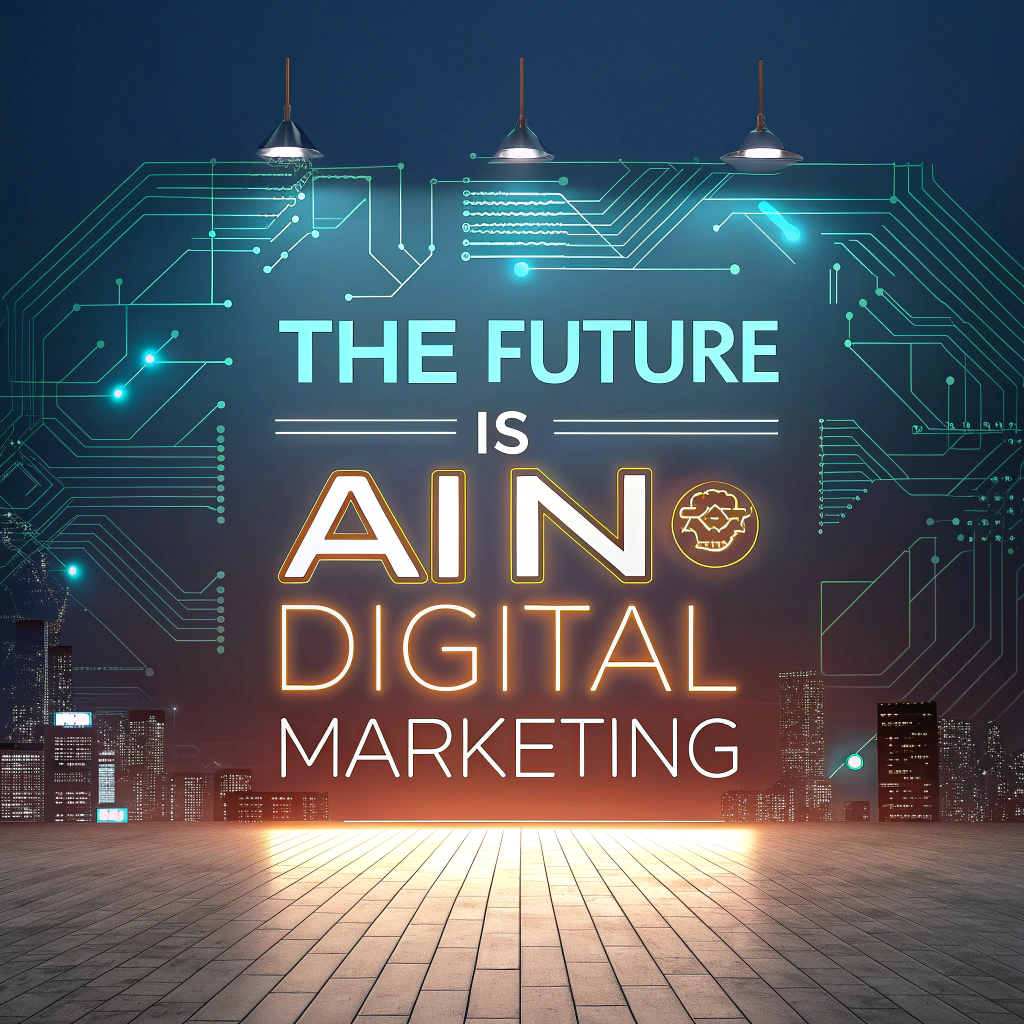 As we have explored in this comprehensive guide, AI in digital marketing is no longer a futuristic concept—it is already reshaping how businesses engage with audiences, create content, optimize campaigns, and make data-driven decisions. From predictive analytics and automation to hyper-personalization and AI-powered customer support, the impact of AI is evident across every facet of digital marketing.
As we have explored in this comprehensive guide, AI in digital marketing is no longer a futuristic concept—it is already reshaping how businesses engage with audiences, create content, optimize campaigns, and make data-driven decisions. From predictive analytics and automation to hyper-personalization and AI-powered customer support, the impact of AI is evident across every facet of digital marketing.
Businesses that embrace AI gain a competitive edge, as AI tools allow them to analyze massive amounts of data quickly, understand consumer behavior at a granular level, and deliver personalized experiences that drive engagement, conversions, and loyalty. By using AI-powered tools for SEO, social media, email marketing, content creation, paid advertising, and analytics, marketers can optimize strategies in real time and achieve measurable results that were previously impossible.
However, the adoption of AI also comes with challenges and ethical considerations. High initial costs, data quality issues, integration complexities, and talent gaps can make implementation difficult. Moreover, ethical concerns such as data privacy, algorithmic bias, and transparency in AI-driven campaigns require marketers to be responsible and proactive. Businesses must adopt AI thoughtfully, ensuring that customer data is protected, AI systems are regularly audited, and human oversight complements automated processes.
The future of AI in digital marketing is full of exciting possibilities. Emerging technologies like generative AI, natural language processing (NLP), computer vision, and voice search are transforming marketing strategies and opening new avenues for engagement. AI will continue to evolve, providing more sophisticated tools that not only analyze and predict but also prescribe optimal marketing strategies. This evolution will allow businesses to create hyper-personalized, immersive experiences for their customers, enhancing satisfaction and loyalty while improving efficiency and ROI.
For students and professionals, understanding AI in digital marketing is essential for career growth. Skills in AI integration, data analytics, predictive modeling, and AI-driven content creation are in high demand across industries. Learning how to leverage AI tools effectively will position marketers as strategic leaders who can drive innovation and results in a competitive digital landscape. Whether you aspire to become an AI marketing specialist, data analyst, or content strategist, gaining proficiency in AI-driven marketing tools can open doors to exciting, high-paying opportunities.
In conclusion, AI in digital marketing represents a paradigm shift in how businesses connect with audiences, make strategic decisions, and achieve growth. While challenges exist, the benefits far outweigh the risks when AI is implemented responsibly and strategically. Companies that embrace AI early, invest in the right tools, and develop a skilled workforce will thrive, while those that delay adoption risk falling behind in an increasingly competitive digital environment.
The future of digital marketing is intelligent, data-driven, and personalized, powered by AI. By integrating AI into every stage of the marketing process—from content creation and SEO to customer engagement and analytics—businesses can unlock unparalleled efficiency, creativity, and profitability. The journey toward AI-driven marketing may require effort, investment, and learning, but the rewards are transformative.
Ultimately, AI in digital marketing is not just a tool—it is a revolution. It enables marketers to anticipate customer needs, optimize campaigns, and deliver experiences that are relevant, timely, and meaningful. Businesses that leverage AI strategically will not only survive but thrive in the digital age, creating lasting value for customers and setting the standard for innovation in marketing.
The opportunity is clear: embrace AI in digital marketing today, and secure a smarter, more efficient, and customer-centric future for your business and career.
Kickstart Your Digital Marketing Career with Cambridge Infotech
Are you ready to embark on a transformative journey into the world of digital marketing? Look no further than Cambridge Infotech, a leading training institute in Bangalore renowned for its industry-aligned curriculum and hands-on approach.
Why Choose Cambridge Infotech?
Expert Trainers: Learn from seasoned professionals with over 8 years of experience in digital marketing.
Comprehensive Curriculum: Master SEO, SEM, social media marketing, Google Ads, content marketing, and more.
Practical Exposure: Work on live projects and case studies to gain real-world experience.
Flexible Learning Options: Choose between online and offline classes to suit your schedule.
Placement Assistance: Benefit from dedicated support to help you land your dream job in digital marketing.
Convenient Locations in Bangalore
Kalyan Nagar: View on Google Maps
Contact Us Today
Phone: +91-9902461116
Email: info@cambridgeinfotech.io
Website: www.cambridgeinfotech.io
Enroll Now and Transform Your Future
Don’t miss out on the opportunity to learn from the best and kickstart your career in digital marketing. Enroll now at Cambridge Infotech and take the first step towards a successful digital marketing career.
FAQs – AI in Digital Marketing
1. What is AI in digital marketing?
AI in digital marketing refers to the use of artificial intelligence technologies to automate, optimize, and personalize marketing campaigns across channels such as SEO, social media, email, content, and ads.
2. How does AI improve digital marketing strategies?
AI analyzes large datasets, predicts customer behavior, automates repetitive tasks, and delivers personalized content, helping marketers make smarter decisions and improve campaign performance.
3. Which AI tools are best for digital marketing in 2025?
Some top AI tools include Jasper AI, Copy.ai, SurferSEO, SEMrush AI, Hootsuite Insights, Google Analytics 4, and Drift for content creation, SEO, social media, analytics, and customer engagement.
4. Can AI replace human marketers?
AI supports and enhances human marketers by automating tasks and providing insights but cannot fully replace creativity, strategy, and human decision-making in marketing.
5. How does AI help in SEO?
AI helps identify trending keywords, optimize content, improve site structure, analyze user behavior, and predict ranking opportunities, making SEO strategies more effective.
6. Is AI in digital marketing expensive for beginners?
While some advanced AI tools can be costly, many beginner-friendly platforms and free AI tools are available to help students and startups get started with AI-driven marketing.
7. How does AI improve customer engagement?
AI chatbots, personalized recommendations, and predictive analytics provide 24/7 support, real-time responses, and tailored experiences that increase customer satisfaction and conversions.
8. Are there ethical concerns in using AI for marketing?
Yes, challenges include data privacy, algorithmic bias, transparency, and misuse of AI for misleading personalization. Responsible AI practices are essential.
9. How can students learn AI in digital marketing?
Students can enroll in certified courses from institutes like Cambridge Infotech, offering online/offline classes, hands-on projects, and global certifications.
10. What is the future of AI in digital marketing?
AI will continue to advance with predictive analytics, generative AI, voice/visual search, and omnichannel automation, making marketing more intelligent, personalized, and efficient.
